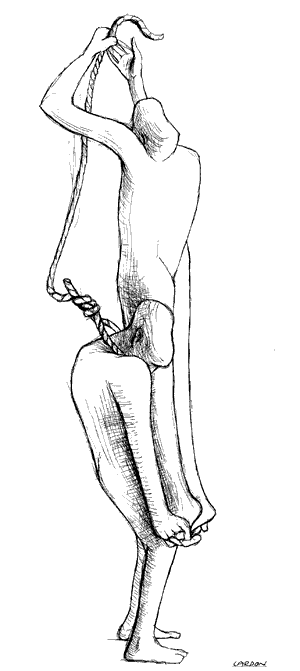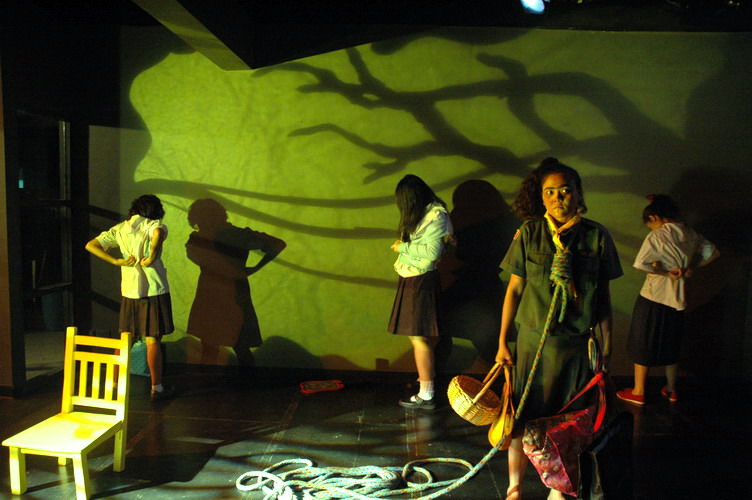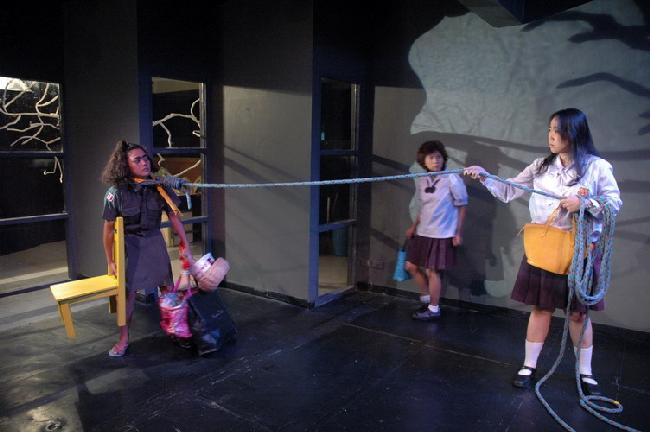I think this list is the strangest Iist I have made, because all of the things in the list cannot be appropriately categorized by using the same adjective. I think the word “strange” is actually too broad to cover all of these things, but I can’t think of any other words. Some of these things are absurd. Some are not. Some of these things are surreal. Some are allegorical. Some contain symbols. Some are about human conditions. I put all of these things into the same list just because I feel that they should be compared to one another. I make this list depending on my feelings. I feel that many of the things in this list share something in common, but I don’t know how to describe it. I just feel it.
--For more information on THE THEATRE OF THE ABSURD, please read:
http://www.theatredatabase.com/20th_century/theatre_of_the_absurd.html
THESE GREAT FILMS/THINGS GIVE ME THE SAME KIND OF STRANGE FEELINGS. WHICH ONES DO YOU LIKE?
1.ABSENCE (Peter Handke, novel)
I borrowed this book from the Goethe Institute’s library many years ago. I don’t know if it is available or not.
This is the description of this novel from www.amazon.com :
“German author Handke ( Afternoon of a Writer ) enlarges the recurrent metaphysical preoccupations of his prolific output in this latest challenging and rewarding novel. The story's four nameless protagonists meander through a surreally disconnected and flattened landscape. An old artist, a gambler ignorant of himself, a callow soldier whose self-effacing "absence" is a defense against the world, and a vain woman whose frantic mirror-staring fails to make her present to herself, "roam"--as the novel's epigraph from Chuang Tzusp ok puts it--"in the palace of Nowhere, where all things are one." As they wander across an almost featureless northern plain, the past, present and future become one and the characters' insubstantial identities collapse into one another. But when they detect legible symbols in the surrounding blankness and read them with conviction, the landscape springs into recognizable life and the characters discover their strength. In this smoothly written fable, Handke forcefully summons readers to the recognition that the essence of human life lies in the striving for self-expression even though its perfect realization must always remain elusive.”
2.THE BEAUTIFUL WASHING MACHINE (2004, James Lee, Malaysia)
3.THE CASTLE (1997, Michael Haneke, Austria)
4.LE COMPLEXE DE THENARDIER (2002, Jean-Michel Ribes, French play)
The recording of this play was shown at Alliance Francaise in Bangkok a few years ago. It is adapted from Josef Pliya’s play.
This is the synopsis:
http://www.nac-cna.ca/en/nacnews/viewnews.cfm?ID=594&cat=catFT
“Outside, the world is destroyed. There was — there is? — a civil war, ethnic cleansing. Inside, life goes on as usual for the lady of the house and her servant girl, Vido, who owes her mistress her safety but is desperate to escape. Between them, words. Never a full-blown confrontation, but a slow accretion of words and phrases that gradually strangle them. Has young Vido been a little less attentive to her household tasks since she met that "blue-haired" soldier? She longs to find her real mother, her real father. She yearns to break free of her abusive bond with this haughty, cruel, endlessly humiliating woman, this "mother" who tells her, like a slap in the face: "I'm using you to reconstruct the gaps in my own childhood."
This is an excerpt from the dialogue in LE COMPLEXE DE THENARDIER:
http://entractes.sacd.fr/en/oeuvre_edite2.php?idoeuvre=265&l=ma
“THE MOTHER: People say such nonsense. Times of peace are hard. Before, during the war, you opened your windows and there were colours everywhere. They would say anything - that things would be better in times of peace, and that the lights would stop going out. And they said that a house cleaner comes cheap and all you have to do is wish for one. So people imagine all kinds of things in the middle of a war. They imagine a maid who does everything and smiles as if she means it. You dream of things being cared for, of lavender and flowers being watered. And even if it isn't true, you dream anyway. […]People say such nonsense. Times of war are easier. In the crux of winter, you open your door to an unknown woman and all your childhood memories come flooding back. Your brothers and sisters shouting in the courtyard, your mother's orders flying with the dust, little hands running like ants. And time. Time to laugh at nothing because it's good to laugh; time to chat about this one and that one, about yourself and the whole world. Time in the kitchen for endless cooking that you drag out even longer because you've got so much time. Time to live. […] People say such nonsense. There are no masters, no slaves. There are ways of living or surviving, and when you can't take any more of war and violence, you search for whatever you can get, and you take what you find. And what you find is childhood, the vast landscape of your childhood. There's the courtyard, the shouting, the voices and the kitchen. And a mother saying "Lemon" and ten little hands rushing to hand her the lemon. "Fountain" and my sisters and I were flooded with drops of water from head to toe. "Dreams" and we could sleep peacefully until noon since those little hands were there for the coffee, the tea, and the chicory. […]People say such nonsense. Times don't change. There is no before and no now. There is no here or elsewhere. There is no gratitude, no consideration or respect. Only one thing remains: self-interest. Anything can be bought, sold and paid for. Anything. There is no humanity. No humanity”
This is a clip from LE COMPLEXE DE THENARDIER, though not from the version I saw:
http://www.youtube.com/watch?v=EwxfZ79MNL4
5.CHICKEN SMILE (2005, Tossapol Boonsinsukh, Thailand)
6.CUBE (1997, Vincenzo Natali, Canada)
7.DEAD 1+ (2007, Ko & Edge Co., Japanese play)
This is a clip fro Ko & Edge Co.
http://www.youtube.com/watch?v=X_aP3xBiV-E
8.THE DISCREET CHARM OF THE BOURGEOISIE (1972, Luis Bunuel, France)
9.GROB (FRAME) (2001, Nat Rittarom, Thailand)
10.HISTORY OF CHEMISTRY (2004, Lu Chunsheng, China)
The synopsis below is from
http://www.galerie-meile.ch/nav/top/artists/text/default.htm?view_ArtistItem_OID=56
“With its masterly photography and outstanding sound track, History of Chemistry (29'27", 2004) is a b/w and colour video without speech and having a mirror-like structure in which poetry and reality, nature and industry, inner and external worlds are confronted and questioned by a captain with a scanty crew and no ship, the protagonist of the third short movie by Chinese artist Lu Chunsheng (1968). It is a captain who has gone adrift, wrecked on a strange land where he is cast in an adventure that becomes a quest for practical and existential solutions. Circumstances, individual fears and the search for knowledge all impact the different characters and especially the captain, whose sense of responsibility brings him to walk alone and resolutely towards an industrial complex. By realizing and accepting the necessity of a painful decision, he starts his voyage to conquer a new territory of awareness - the inevitability of progress. By means of a hammer, the captain restarts a metaphorical process of civilization and shapes the world according to a rational framework. The voice of the main symbolic elements of the video - water, earth, sky and industry- are thus overwhelmed by the thrilling rhythm of the human will.”
http://farm4.static.flickr.com/3293/2713463637_b4025f7396_o.jpg
11.THE IMPRINT (1975, Jacques Cardon, French animation)
These are images from Cardon, though not from the film THE IMPRINT:
http://www.irancartoon.com/100/exhibition/cardon/
http://farm4.static.flickr.com/3279/2713463627_505374caf5_o.gif
http://farm4.static.flickr.com/3148/2713463621_b1fc28dbf8_o.jpg
12.PERFECT BALANCE? (2007, Parinya Janpengpen, Thailand)
The film is too short for me to understand, but I still like it very much.
13.THE RETURN (2008, Baek Kyoung-suk, Korean play)
http://nottle.co.kr/englishnottle1.htm
14.SHATTER ROOM NO. 0 (2008, Teerawat Mulvilai + Jarunun Phantachat, Thai play)
15.SIDA? (2005, Santiphap Inkong-ngam, Thailand)
16.THE THING (2008, Fari Tesprateep, Thailand)
I didn’t understand this film at all. It is very weird. However, Thisisgis wrote about an interpretation of this film in his blog, and I think I agree with him about the interpretation.
Thisisgis wrote about it in Thai here:
http://thisisgis.multiply.com/journal/item/111/111
17.WAITING FOR G.D. (2008, Damkerng Thitapiyasak, Thai play)
http://crescentmoonspace.blogspot.com/
http://farm4.static.flickr.com/3139/2713463633_60dc2aa688_o.jpg
http://farm4.static.flickr.com/3060/2713463631_29c4b996c1_o.jpg
18.WELCOME TO NOTHING (2008, Noppan Boonyai, Thai play)
19.WOMAN IN THE DUNES (1964, Hiroshi Teshigahara, Japan)
20.YASUJIRO’S JOURNEY (2004, Faozan Rizal, Indonesia)
Nathan Andersen wrote about this film in Senses of Cinema:
http://www.sensesofcinema.com/contents/06/38/rizal.html
“The younger man’s journey, as it is portrayed in this impressive and atmospheric debut film, is not so much a literal quest to find an older man but a spiritual quest to find himself in the foreign landscape his ancestor had wandered. The fact he never does find what he is looking for, and is himself never found again, is relevant to a reading of one of the more peculiar scenes in the film, in which the younger Yasujiro meticulously stacks a series of stones into a pillar that fills the height of the screen, then moves away, shows dissatisfaction, knocks it over, and then builds again.”
You can cast multiple votes.
--I wanted to include HALLUCINATION (2002, Sopon Sakdapisit, 16 min, A+++++) in this list, because the film is also about a surreal situation in a toilet, in which many characters can’t seem to agree whether the time is night or day. But I exclude the film from this list because the situation becomes explainable in the end. What we just saw is just a hallucination of someone who took amphetamine.
--DOPPELSTECKER (1986, Richard Blank, West Germany) also gives me the same kind of strange feelings, but I don’t like this film as much as other things in the list.





1 comment:
My own vote is for THE CASTLE, GROB (FRAME), DEAD 1+, and WELCOME TO NOTHING.
Post a Comment